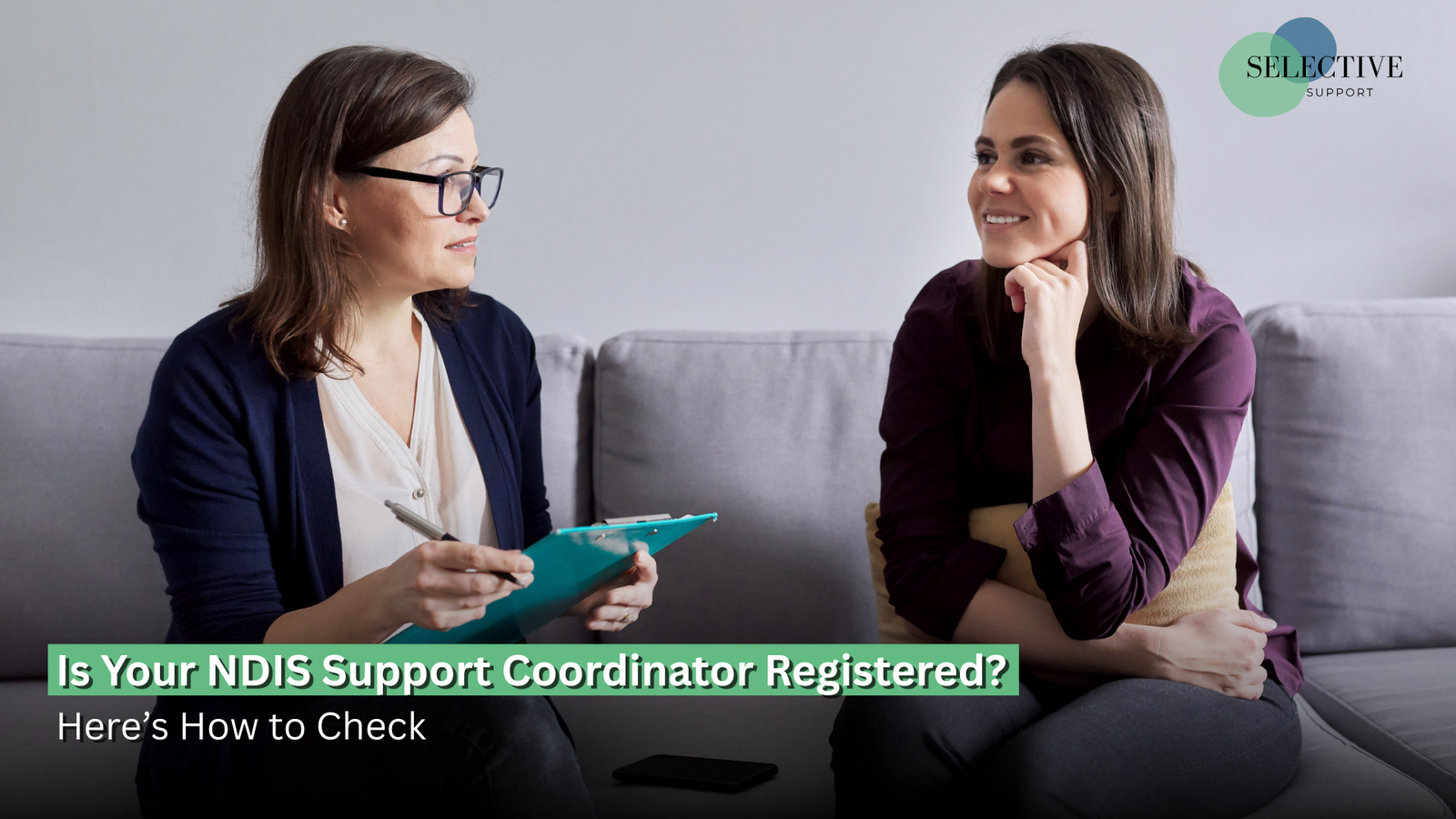Is your Support Coordinator NDIS Provider Registered?
Have you ever been told your support coordinator must be NDIS registered, and then felt unsure what that actually means? It’s a common confusion, especially when you’re already juggling appointments, funding rules, and the pressure of finding the right help. In a system where nearly 60% of disability care participants rely on support coordination, knowing who you can trust matters more than ever.
This guide walks you through six simple steps to check if a provider is genuinely qualified, not just on paper, but in how they support you. Whether you’re new to the NDIS or reassessing your options, this article will help you make informed, confident decisions about your care.
Do Support Coordinators Need to Be NDIS Registered?
When you’re trying to figure out your disability care supports, the question of whether your support coordinator must be NDIS registered can feel confusing. Here’s what the rules say as of 2025, and what it means for you.
What the NDIS Commission Says in 2025
Support coordinators can be either registered or unregistered, depending on how your plan is managed. The NDIS Commission requires registration if your support is managed directly by the NDIA, this is usually the case in agency‑managed plans.
When NDIS Registration Is Required
Some services always require provider registration, things like specialist disability accommodation (SDA), behaviour support, restrictions that are regulated, and support for NDIA‑managed plans. Right now, registration for support coordination isn’t automatically required in all cases. But that’s changing: a shift toward mandatory registration is underway, set to roll out from July 2025, after public consultation wrapped up in early 2025.
What This Means for You as a Participant or Carer
You don’t have to have a degree in NDIS rules to feel confident in your supports. If your plan is self‑managed or plan‑managed, you can work with unregistered coordinators, many of whom are caring, experienced, and deeply committed to supporting you. That said, once mandatory registration arrives, registered providers will be easier to check and trust.
Want help understanding your plan or finding a trusted coordinator? Book a free discovery call with Selective Support.
6 Steps to Check a Support Coordinator’s NDIS Registration
If you’re feeling unsure about whether a support coordinator is genuinely qualified or officially registered, you’re not alone. The NDIS system can be tricky to navigate, especially when you just want someone you can trust. These six simple steps will help you feel more confident and informed, so you can make the best decision for your care, your plan, and your life.
Step 1 – Ask Directly and Watch for Clear Answers
It might sound simple, but the best way to begin is to ask the coordinator directly: “Are you a registered NDIS provider?” or “Can you support NDIA-managed plans?” A trustworthy provider will always be open about their registration status and happy to explain what that means for you.
Pay attention to how they answer. Do they avoid the question or speak in confusing terms? Or do they explain things clearly and respectfully? Their response will tell you a lot about how they’ll support you moving forward.
Step 2 – Search the NDIS Provider Finder Tool
The NDIS Provider Finder is a helpful online tool that lets you check if someone is officially registered. All you need is the provider’s name or ABN.
Once you enter their details, the tool will confirm their registration status, services offered, and contact info. This is especially useful if your plan is agency-managed and you must use a registered provider.
Step 3 – Check Their Google Reviews and Website
Next, take a look at their Google reviews and website. You’re looking for real stories, transparent information, and up-to-date content. A good support coordinator will clearly explain who they are, what they offer, and how they help.
Watch for red flags:
- No recent reviews
- Vague descriptions of services
- No contact information or photos
These can all suggest a lack of credibility or connection.
Step 4 – Confirm They Provide the Right Coordination of Supports NDIS Services
Not all support coordinators offer the same types of help. Some might only offer general support, while others specialise in psychosocial recovery coaching, mental health support, or community participation.
If you have specific needs, like managing anxiety, accessing therapy, or building a daily routine, ask if the coordinator has experience in that space. The right coordination of supports NDIS services should align with your life, not just your plan.
“A good support coordinator doesn’t just understand the NDIS, they understand you. The best coordination of supports NDIS services are tailored to your goals, your challenges, and the way you want to live your life.”
– Selective Support team

Step 5 – Review Their Response Time and Communication
Good support is about more than paperwork, it’s also about being able to reach someone when it matters. Try contacting them via email or phone. How quickly do they get back to you? Are they friendly and easy to understand?
At Selective Support, we respond within 24 hours, because your time and wellbeing matter.
Step 6 – Ask About Continuity and Personalisation
This one’s important. Ask: “Will I have the same coordinator over time?” or “Do you get to know your clients personally?”
A strong relationship makes a huge difference. You deserve someone who listens, remembers your story, and walks with you, not just someone who fills out forms and disappears.
Why Provider Registration Isn’t Everything
When it comes to choosing the right support coordinator, it’s easy to focus on whether they’re registered. And while that’s an important detail, especially for NDIA-managed plans, it’s only one part of the bigger picture.
A registered provider might tick all the official boxes, but that doesn’t always mean they’re the best fit for you. What matters just as much (if not more) is how they treat you, how well they listen, how quickly they respond, and whether they truly understand your needs.
Trust, Compassion, and Real Support Matter Most
Take Nathan, for example. He lives with a psychosocial disability and used to dread phone calls and feel completely overwhelmed by his plan. Then he found a support coordinator who didn’t just explain funding, they checked in regularly, helped him join a local art group, and celebrated small wins. That’s what real support looks like.
What to Look for in NDIS Support Coordination Providers
Beyond registration, the best support coordinators and NDIS support coordination providers will show up with:
- Clear, open communication
- A genuine interest in your wellbeing
- Experience in mental health and psychosocial supports
- Consistent follow-through, no handovers or repeating your story
If your coordinator helps you feel informed, empowered, and seen, you’re in the right hands.
Looking for a coordinator who really listens and shows up for you? Meet the team at Selective Support.
You Deserve Support That’s Honest and Easy to Trust
You don’t need to understand every rule in the NDIS system, but knowing how to check a provider’s registration and choose someone who truly listens can make a world of difference. From asking the right questions to spotting red flags, these steps are about helping you feel more confident, more informed, and more in control of your disability care journey.
At Selective Support, we believe the right support starts with trust, not tick-boxes. Whether you’re new to the NDIS or just ready for a more personal approach, we’re here to walk beside you, not ahead of you.
Still unsure about your current support? Let’s talk it through. Get in touch with Selective Support today.
Frequently Asked Questions About NDIS Support Coordinators
1. Can I change my NDIS support coordinator if I’m not happy?
Yes, you can. If your current support coordinator isn’t meeting your needs or you feel unsupported, you have the right to request a change at any time. Speak with your plan manager or the NDIS directly to update your service agreement and find someone who’s a better fit for your goals.
2. How do I know if my support coordinator specialises in mental health?
Ask them directly about their experience with psychosocial disabilities or mental health-related supports. Look for language on their website or profile that mentions mental health, recovery coaching, or trauma-informed care. A good provider will be open and honest about their strengths.
3. Do I pay extra to work with a registered support coordinator?
No. Whether your coordinator is registered or unregistered, they are paid at the same hourly rate set by the NDIS price guide. The cost comes from your plan’s support coordination budget, not out of your pocket. What matters most is finding someone who helps you get the most from your plan.


